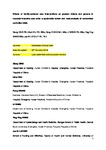Effects of family-centered care interventions on preterm infants and parents in neonatal intensive care units: a systematic review and meta-analysis of randomized controlled trials
| dc.contributor.author | Ding, X | |
| dc.contributor.author | Zhu, L | |
| dc.contributor.author | Zhang, R | |
| dc.contributor.author | Wang, L | |
| dc.contributor.author | Wang, T-T | |
| dc.contributor.author | Latour, Jos M | |
| dc.date.accessioned | 2018-12-02T12:00:25Z | |
| dc.date.issued | 2019-01 | |
| dc.identifier.issn | 1036-7314 | |
| dc.identifier.issn | 1878-1721 | |
| dc.identifier.uri | http://hdl.handle.net/10026.1/12967 | |
| dc.description.abstract |
Objective: To review English and Chinese randomized controlled trials (RCTs) to determine the effects of family-centered care interventions on preterm infants’ and parental outcomes in Neonatal Intensive Care Units and to conduct a meta-analysis. Review method used: Systematic review and meta-analysis. Data sources: MEDLINE, CINAHL, EMBASE, PsycInfo, BNI, AMED and the Chinese databases CNKI and Wanfang were searched in April 2017 and updated in August 2018. Review methods: Only RCTs were included. Participants were preterm infants ≤ 37 weeks gestational age and parents. Interventions were related to family-centered care and outcome measures were infant and parent clinical outcomes. Included studies were assessed for risk of bias using Cochrane Manual 5.1.0. Meta-analyses used Mean Differences (MD), Standardized Mean Differences (SMD) or Odds Ratio (OR) followed by 95% Confidence Interval (CI). Heterogeneity was tested with Cochran’s Q chi-square, tau-squared and inconsistency index (I2). Results: Included were 19 studies (10 from English and 9 from Chinese databases); meta-analysis included 15 studies (7 English and 8 Chinese RCTs). Meta-analysis showed significant improvements in weight gain (7 studies: MD 4.57; 95%CI: 2.80;6.34; P<0.001; I2 94%); readmission (3 studies: OR=0.23; 95%CI: 0.10;0.52; P<0.001; I2=0%); parent satisfaction (5 studies: OR=11.20; 95%CI: 4.76;26.34; p<0.001; I2=0%); Skills of parents (4 studies: SMD=2.57; 95%CI: 2.19;2.96; P<0.001; I2=53%); Knowledge of parents (4 studies: SMD=2.74; 95%CI: 2.47;3.00; P<0.001; I2=0%); Parental anxiety at follow-up: (3 studies: SMD=-0.19; 95%CI: -0.28;-0.09; P<0.001; I2=0%); Parent depression at follow-up: (2 studies: SMD=0.37; 95%CI: -0.63;-0.12; P=0.004; I2=44%); Parental stress: (3 studies: MD=-0.20; 95%CI: -0.26;-0.13; P<0.001; I2=0%). No statistical differences were observed in neuro-behavioral-development (3 studies) and hospital-length-of-stay (7 studies). Conclusions: Family-centered care interventions can improve weight gain and readmission in preterm infants as well as parent satisfaction, knowledge and skills, and possibly long-term anxiety, depression and stress. Developing standardized outcome sets for testing family-centered care interventions is recommended. | |
| dc.format.extent | 63-75 | |
| dc.format.medium | Print-Electronic | |
| dc.language | en | |
| dc.language.iso | en | |
| dc.publisher | Elsevier | |
| dc.subject | Family Centered Care | |
| dc.subject | Infant | |
| dc.subject | Meta-Analysis | |
| dc.subject | Neonatology | |
| dc.subject | Nursing | |
| dc.subject | Parents | |
| dc.subject | Randomized Controlled Trials | |
| dc.title | Effects of family-centered care interventions on preterm infants and parents in neonatal intensive care units: a systematic review and meta-analysis of randomized controlled trials | |
| dc.type | journal-article | |
| dc.type | Journal Article | |
| dc.type | Multicenter Study | |
| dc.type | Systematic Review | |
| plymouth.author-url | https://www.webofscience.com/api/gateway?GWVersion=2&SrcApp=PARTNER_APP&SrcAuth=LinksAMR&KeyUT=WOS:000454635000012&DestLinkType=FullRecord&DestApp=ALL_WOS&UsrCustomerID=11bb513d99f797142bcfeffcc58ea008 | |
| plymouth.issue | 1 | |
| plymouth.volume | 32 | |
| plymouth.publication-status | Published | |
| plymouth.journal | Australian Critical Care | |
| dc.identifier.doi | 10.1016/j.aucc.2018.10.007 | |
| plymouth.organisational-group | /Plymouth | |
| plymouth.organisational-group | /Plymouth/Faculty of Health | |
| plymouth.organisational-group | /Plymouth/Faculty of Health/School of Nursing and Midwifery | |
| plymouth.organisational-group | /Plymouth/REF 2021 Researchers by UoA | |
| plymouth.organisational-group | /Plymouth/REF 2021 Researchers by UoA/UoA03 Allied Health Professions, Dentistry, Nursing and Pharmacy | |
| plymouth.organisational-group | /Plymouth/Research Groups | |
| plymouth.organisational-group | /Plymouth/Research Groups/Institute of Health and Community | |
| plymouth.organisational-group | /Plymouth/Research Groups/Plymouth Institute of Health and Care Research (PIHR) | |
| plymouth.organisational-group | /Plymouth/Users by role | |
| plymouth.organisational-group | /Plymouth/Users by role/Academics | |
| dc.publisher.place | Australia | |
| dcterms.dateAccepted | 2018-10-28 | |
| dc.rights.embargodate | 2019-12-13 | |
| dc.identifier.eissn | 1878-1721 | |
| dc.rights.embargoperiod | Not known | |
| rioxxterms.version | Accepted Manuscript | |
| rioxxterms.versionofrecord | 10.1016/j.aucc.2018.10.007 | |
| rioxxterms.licenseref.uri | http://www.rioxx.net/licenses/all-rights-reserved | |
| rioxxterms.licenseref.startdate | 2019-01 | |
| rioxxterms.type | Journal Article/Review |


